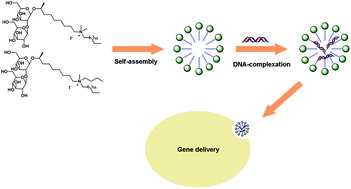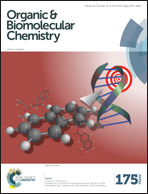Evaluation of the transfection efficacies of quaternary ammonium salts prepared from sophorolipids†
Abstract
Five quaternary ammonium amphiphilic compounds were synthesized from sophorolipid 1. These compounds were formulated in aqueous media and some of them (5 and 6) produced well-defined supramolecular aggregates which were characterized by DLS and zeta measurements. Their capacity to transfect four different eukaryotic cell lines in vitro was assessed. To evaluate the influence of the carbohydrate head group from the sophorolipids on the transfection efficacies, their deglycosylated analogues were also synthesized and tested for gene delivery. For all the compounds, the use of DOPE as a helper lipid in a 1 : 1 molar ratio with the ammonium-based lipids was required to obtain homogeneous formulations. The transfection results indicate that quaternary ammonium-based sophorolipids proved to be more efficient pDNA carriers than their deglycosylated counterparts. Moreover, the presence of the carbohydrate head group clearly contributed to the good biocompatibility of these cationic lipids. These cationic sophorolipid derivatives thus offer good potential for the development of new vectors for gene delivery based on renewable resources.


 Please wait while we load your content...
Please wait while we load your content...